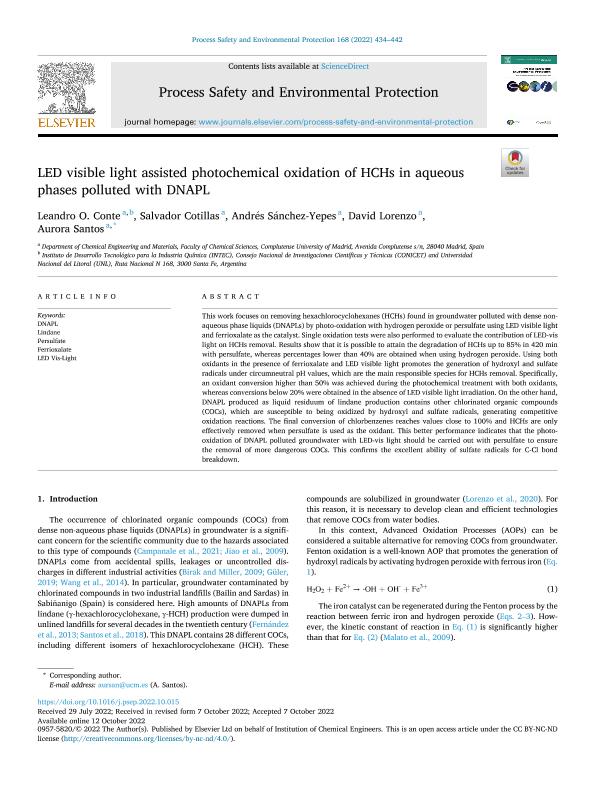Mostrar el registro sencillo del ítem
dc.contributor.author
Conte, Leandro Oscar

dc.contributor.author
Cotillas, Salvador
dc.contributor.author
Sánchez Yepes, Andrés
dc.contributor.author
Lorenzo, David
dc.contributor.author
Santos, Aurora
dc.date.available
2023-11-23T18:47:47Z
dc.date.issued
2022-12
dc.identifier.citation
Conte, Leandro Oscar; Cotillas, Salvador; Sánchez Yepes, Andrés; Lorenzo, David; Santos, Aurora; LED visible light assisted photochemical oxidation of HCHs in aqueous phases polluted with DNAPL; Elsevier; Process Safety and Environmental Protection; 168; 12-2022; 434-442
dc.identifier.issn
0957-5820
dc.identifier.uri
http://hdl.handle.net/11336/218564
dc.description.abstract
This work focuses on removing hexachlorocyclohexanes (HCHs) found in groundwater polluted with dense non-aqueous phase liquids (DNAPLs) by photo-oxidation with hydrogen peroxide or persulfate using LED visible light and ferrioxalate as the catalyst. Single oxidation tests were also performed to evaluate the contribution of LED-vis light on HCHs removal. Results show that it is possible to attain the degradation of HCHs up to 85% in 420 min with persulfate, whereas percentages lower than 40% are obtained when using hydrogen peroxide. Using both oxidants in the presence of ferrioxalate and LED visible light promotes the generation of hydroxyl and sulfate radicals under circumneutral pH values, which are the main responsible species for HCHs removal. Specifically, an oxidant conversion higher than 50% was achieved during the photochemical treatment with both oxidants, whereas conversions below 20% were obtained in the absence of LED visible light irradiation. On the other hand, DNAPL produced as liquid residuum of lindane production contains other chlorinated organic compounds (COCs), which are susceptible to being oxidized by hydroxyl and sulfate radicals, generating competitive oxidation reactions. The final conversion of chlorbenzenes reaches values close to 100% and HCHs are only effectively removed when persulfate is used as the oxidant. This better performance indicates that the photo-oxidation of DNAPL polluted groundwater with LED-vis light should be carried out with persulfate to ensure the removal of more dangerous COCs. This confirms the excellent ability of sulfate radicals for C-Cl bond breakdown.
dc.format
application/pdf
dc.language.iso
eng
dc.publisher
Elsevier

dc.rights
info:eu-repo/semantics/openAccess
dc.rights.uri
https://creativecommons.org/licenses/by-nc-nd/2.5/ar/
dc.subject
DNAPL
dc.subject
FERRIOXALATE
dc.subject
LED VIS-LIGHT
dc.subject
LINDANE
dc.subject
PERSULFATE
dc.subject.classification
Otras Ingeniería del Medio Ambiente

dc.subject.classification
Ingeniería del Medio Ambiente

dc.subject.classification
INGENIERÍAS Y TECNOLOGÍAS

dc.title
LED visible light assisted photochemical oxidation of HCHs in aqueous phases polluted with DNAPL
dc.type
info:eu-repo/semantics/article
dc.type
info:ar-repo/semantics/artículo
dc.type
info:eu-repo/semantics/publishedVersion
dc.date.updated
2023-11-15T15:58:01Z
dc.journal.volume
168
dc.journal.pagination
434-442
dc.journal.pais
Países Bajos

dc.journal.ciudad
Amsterdam
dc.description.fil
Fil: Conte, Leandro Oscar. Universidad Complutense de Madrid; España. Consejo Nacional de Investigaciones Científicas y Técnicas. Centro Científico Tecnológico Conicet - Santa Fe. Instituto de Desarrollo Tecnológico para la Industria Química. Universidad Nacional del Litoral. Instituto de Desarrollo Tecnológico para la Industria Química; Argentina
dc.description.fil
Fil: Cotillas, Salvador. Universidad Complutense de Madrid; España
dc.description.fil
Fil: Sánchez Yepes, Andrés. Universidad Complutense de Madrid; España
dc.description.fil
Fil: Lorenzo, David. Universidad Complutense de Madrid; España
dc.description.fil
Fil: Santos, Aurora. Universidad Complutense de Madrid; España
dc.journal.title
Process Safety and Environmental Protection

dc.relation.alternativeid
info:eu-repo/semantics/altIdentifier/doi/http://dx.doi.org/10.1016/j.psep.2022.10.015
dc.relation.alternativeid
info:eu-repo/semantics/altIdentifier/url/https://www.sciencedirect.com/science/article/pii/S0957582022008801
Archivos asociados
